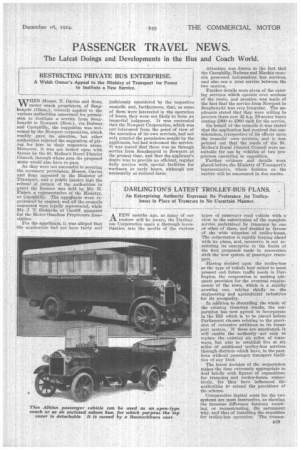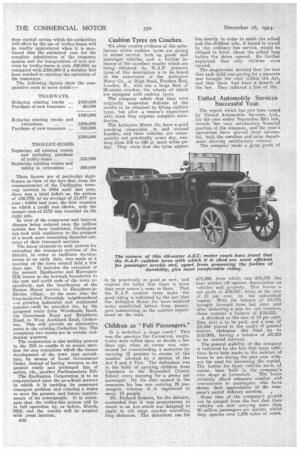DARLINGTON'S LATEST TROLLEY.BUS PLANS.
Page 23

Page 24

If you've noticed an error in this article please click here to report it so we can fix it.
An Enterprising Authority Expresses Its Preference for Trolley. buses in Place of Tramcars in No Uncertain Manner.
AFEW monthsago, as Many of -our readers will he aware, the Darlington-Corporation made a thorough investigation into the merits of the various types of passenger road vehicle with a-
view to the substitution of the complete service maintained by tramcars by one or other of them, and decided in favour of the wide adoption of trolley-buses.The corporation is rapidly forging ahead with its plans, and, moreover, is not restricting its enterprise to the limits of the first proposals made in connection with the' new system of passenger transport.
Raving decided upon the trolley-bus as the type of vehicle best suited to meet present and future traffic needs in Darlington, the corporation is making adequate provision for the eventual requirements of the town, which is a rapidly growing one, relying chiefly on the engineering and agricultural industries for its prosperity.
In addition to discarding the whole of the existing tramway tracks, the corporation has now agreed to incorporate in the Bill which is to be placed before Parliament clauses relating to the provision of extensive additions to its transport system. If these are sanctioned, it will enable the authority not only to replace the existing six iniles of tramways, hut also to establish five or six miles of additional trolley-bus services through districts which have, in the past, been without passenger transport facilities of any kind: The latest decision of the corporation makes the time extremely appropriate to deal briefly with figures of expenditure for tramcars and trolley-buses, resPeetively, for 'they haveinfluenced tint authorities to extend the provisions of the scheme.
Comparative iapital costs for the two systeuis are most instructive, as showing the immense difference between renewing, or reconstructing, the permanent way, and that of installing the requisites for trolley-bus operation. The tremen
dons capital saving which the authorities will effect by the use of trolley-buses will be readily appreciated when it is mentioned that the estimated cost for the complete substitution of the tramway system and the inauguration of new services by trolley-buses is only /60,000, as compared with /300,000 if a decision had been reached to continue the operation of the tramways.
The following figures show the comparative costs in more detail:— TRAMWAYS.
Relaying existing 'tracks ... 1100,000 Purchase of new tramcars ... 60,000 1160,000 „Relaying existing tracks and extensions 1200,000 Purchase of new tramcars 100,000 1300,000 TROLLEY-BUSES.
Replacing all existing routes and including purchase of trolley-buses £35,000 Replacing existing routes and taking in extensions 160,000
These figures are of particular significance in stew of the fact that, from the commencement of the Darlington tramway services in 1904 until last year, there was a total deficit on the system of 136,779, or an average of 11.877 per year ; whilst last year, the first occasion on which a profit was shown, only the meagre sum of 1173 was recorded on the right side.
In view of the repayment and interest charges being reduced once the 'tailless system has been instituted. Darlington can look with confidence to the prospect of a much more reassuring financial outcome of their transport services.
The latest proposal to seek powers for extending the transport services of the district, in order to facilitate developments at an early date, was made at a meeting of the town council held a few days ago. It includes the extension of the present Eastbourne and Harrogate Hill routes to the borough boundaries in the east and north ends of the town respectively, and the lengthening of the Barton Street service to Hanel:non-leSkerne village. At the same time the long-neglected Faverdale neighbourhood —a growing industrial and residential quarter—will be provided for, by the proposed route from Woodlands Road, via Greenbank Road and Brinkburn Road, to West Auckland Road, Cockerton. This will provide an alternative route to the existing Cockerton line. The remaining two routes are in certain residential quarters.
The corporation is also seeking powers in the Bill to enable it to secure sanction for any extensions which the future development of the town may necessitate, by means of Local Government Order, instead of having recourse to the present costly and prolonged line of action, viz., another Parliamentary Bill.
The Darlington Corporation is to be zongratulated upon the go-a-head manner in whkh it is tackling its passenger transport problem and evincing a desire to meet the present and future requirements of its townspeople. It is anticipate that the trolley-bus system will be in full operation by, or before, March, 1926, and the results will be awaited with great interest.
B40
Cushion Tyres on Coaches.
We often receive evidence of the satisfaction which cushion tyres are giving in actual service, both on goods and passenger vehicles, and a further instance of the excellent results which are being obtained by N.A.P. press-on tyres of this description is to be found in the experience of the Arlington Motor Co., of High Road, Ponders End, London, N., who run a large fleet of 28-seater coaches, the wheels of which are equipped with cushion tyres. The company admit that they were originally somewhat dubious of the results to be obtained by fitting cushion tyres, but after a season's experience with them they express complete satisfaction.
The Arlington Motor Co. have a good coaching connection in and around London, and their vehicles are consequently out practically every day, running from NO to 150 or more miles per day. They state that the tyres appear to be practically as good as new, and express the belief that there is more than next season's wear in them. That the N.A.P. cushion tyres make for good riding is indicated by the fact that the Arlington Motor Co. have received many unsolicited letters from passengers commenting on the comfort experienced on the road.
Children as "Full Passengers."
Is a motorbus a stage coach? This was the question TheCarnarvon magistrates were called upon to decide a few days ago, when an owner was summoned for overcrowding a motorbus by carrying 12 persons in excess of the number allowed by a section of the Act 5 and 6 Viet. The defendant was in the habit of carrying children from Llanberis to the Brynrefail County School every morning for a penny per passenger. On the date' named in the summons his bus was carrying 26 passengers, whereas it is registered to carry 14 people.
Mr. Richard Roberts, for the defence, contended that it was preposterous to resort to an Act which was designed to apply to old stage coaches travelling long distances. The defendant ran his bus merely in order to assist the school and the children who, if forced to travel by the ordinary bus service, would be obliged to loiter about the school long before the doors opened. He further explained that only children were carried.
The magistrates decided that the fact that each child was paying for a separate seat brought the case within the Act, and that there had been a breach of the law. They inflicted a fine of 10s.
United Automobile Services Successful Year.
, The report which has just been issued by United Automobile Services, Ltd., for the year ended September 30th last, reveals the very satisfactory finaecial position of the company, and the year's operations have proved most successful, both the omnibus and sales department showing satisfactory returns. The company made a gross profit of
£75,298, from which sum £41,031 has been written off against depreciation on vehicles and property. This leaves a net profit of £34,257, being at the rate of 15 per cent, on the subscribed capital. With the balance of £5,478• brought forward from last year. and after deducting a sum for tax reserves, there remains a balance of £38,823.
A dividend at the rate of 10 percent. (less tax) is to be paid, and a sum of £8,546 placed to the credit of general reserve (bringing this fund up to £10,000), leaving a balance of £8,223 to be carried forward.
The general stability of the company is indicated by the fact that large additions have been made to the number of buses in use during the past year without the need for increasing the capital. The bodies for these vehicles have, of course, been built in the company's own shops at Lowestoft. The buses certainly afford adequate comfort and convenience to passengers, who have shown their appreciation of the company's parcel delivery services.
Some idea of the company's growth can be gauged from the fact that their vehicles are now carrying more than 30 million passengers per annum, whilst they operate over 1,000 miles of route.






























